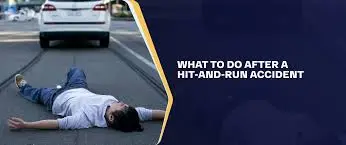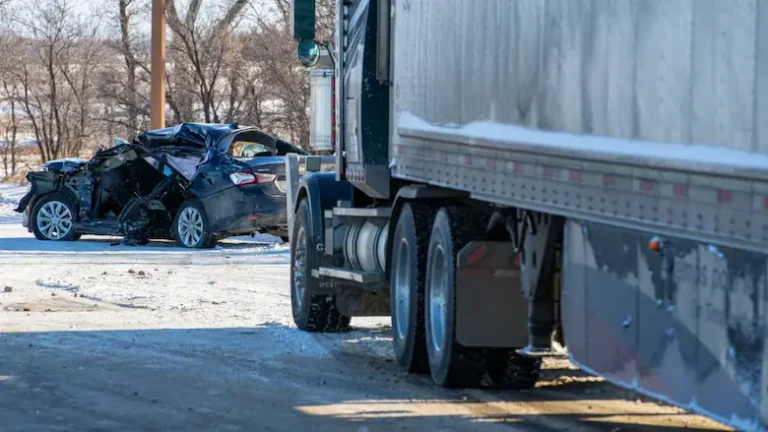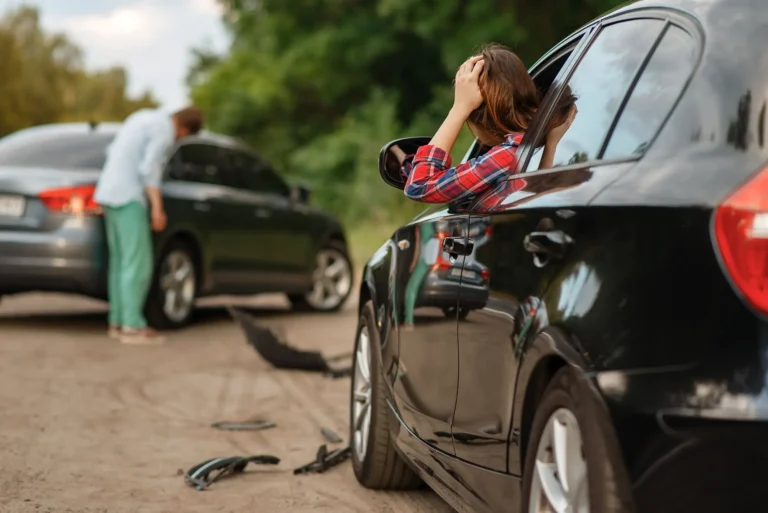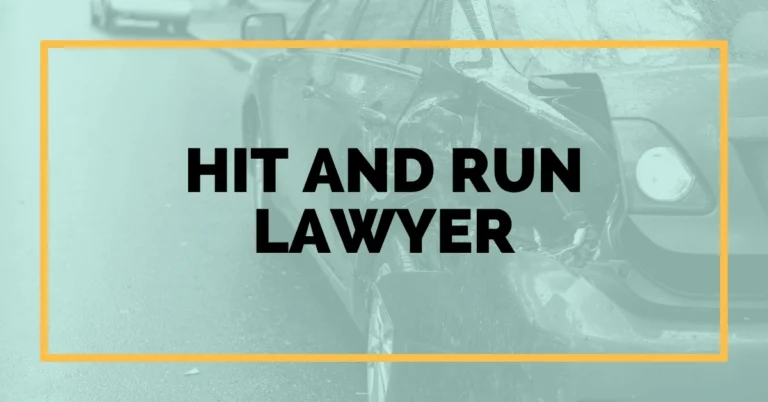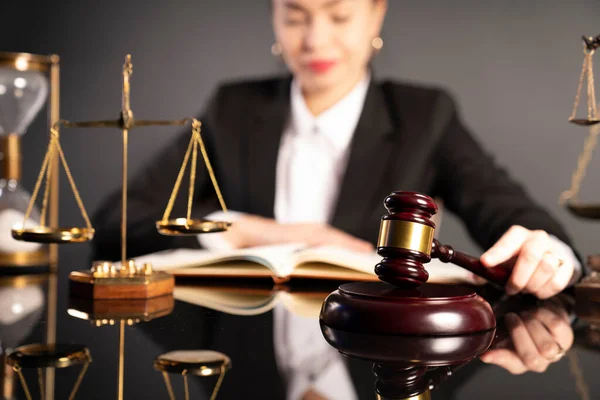What to Do If You’re Involved in a Hit and Run Accident
What to do after hit and run car collision? Being the victim (or witness) of a hit and run accident can be terrifying. Whether it’s a minor fender bender or a serious crash, the immediate aftermath is critical. This guide will walk you through exactly what to do after a hit and run, legally and practically — including whether to call a lawyer and how to protect your rights.
What To Do After Hit And Run
If you’re involved in a hit and run accident, follow these essential steps to stay safe and protect your legal rights:
- Ensure safety first – Move to a safe area if possible and check for injuries.
- Call emergency services – Report the accident to 911 and request medical help if needed.
- Document the scene – Note the vehicle description, license plate (if visible), time, location, and damage.
- Look for witnesses – Ask bystanders if they saw anything and get their contact information.
- Take photos and videos – Capture damage, skid marks, surroundings, and any debris.
- File a police report – Official documentation is crucial for insurance and legal purposes.
- Notify your insurance provider – Report the incident to begin your claim process.
- Consult a hit and run lawyer – A lawyer can help you secure compensation and handle legal complexities.
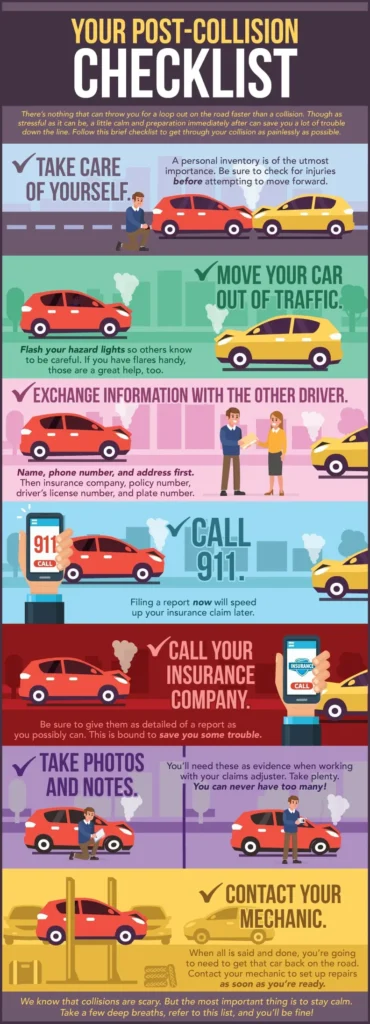
Step-by-step guide to Hit And Run Accident Sufferer
1. Stay Calm and Stay Safe
First, ensure your own safety. Pull over to a safe location if possible and check for injuries. Do not chase the fleeing driver — it’s dangerous and may hurt your case.
2. Call the Police Immediately
Always report the accident to law enforcement. Provide details like:
- Make/model/color of the vehicle
- License plate number (if possible)
- Direction the driver fled
- Location and time of the accident
This report becomes vital evidence later.
3. Gather Evidence at the Scene
If it’s safe, take clear photos of:
- Your car damage
- Surrounding area (e.g. traffic signs, skid marks)
- Any debris from the other vehicle
Also look for CCTV cameras or witnesses nearby.
4. File an Insurance Claim Promptly
Inform your insurance provider and submit your police report number. If the at-fault driver isn’t found, you may still be compensated under:
- Uninsured Motorist Coverage
- Collision Coverage
Tip: If the hit and run is not your fault, make that clear in the claim to avoid higher premiums.
5. Should I Call a Lawyer After a Hit and Run?
Absolutely yes. A hit and run attorney can:
- Help investigate the fleeing driver
- Negotiate with insurance adjusters
- Maximize your compensation
- Defend you if wrongly accused
If there are injuries or serious damage, legal representation is even more crucial.
6.What If the Hit and Run Wasn’t My Fault?
If the other driver fled and you weren’t at fault, you’re still eligible for compensation — often through your own policy. Document everything and let your lawyer handle the technicalities.
7. Can You Go to Jail for Hit and Run?
Yes. If you leave the scene of an accident where someone was injured or killed, you could face misdemeanor or felony charges, including fines, license suspension, or jail time.
- In most U.S. states, even a minor hit and run (e.g. hitting a parked car and fleeing) can lead to criminal charges.
- In major cities like Los Angeles or New York, prosecutors aggressively pursue these cases.
Bonus: Why Acting Fast Improves Your Case
Delays in filing a police report or claim can weaken your position. The longer you wait:
- Evidence disappears
- Witnesses forget details
- Insurance companies may deny coverage
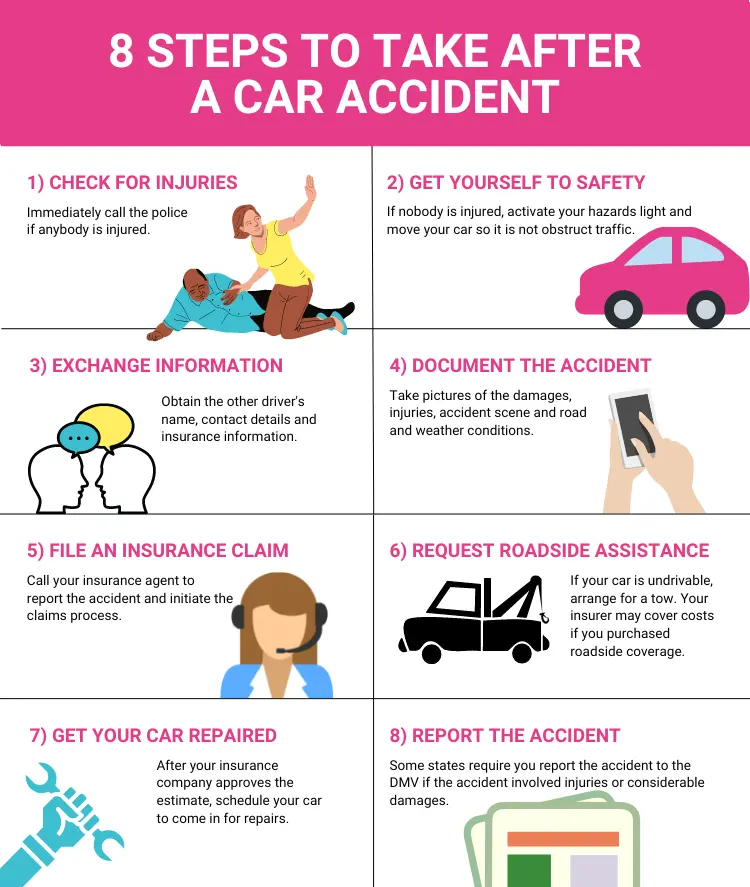
Wrap-Up: The Legal Path Forward
If you’re wondering what to do after a hit and run, remember:
- Call 911 and stay safe
- Collect evidence and file a report
- Call a lawyer if injuries or damage occurred
- File a claim immediately
- Know your rights — especially if you’re not at fault
Your next move could mean the difference between a denied claim and full compensation.
What to Do in a Hit and Run Parked Car Situation
If your parked car was hit and the driver fled, take these steps:
- Document the damage with photos and video.
- Look for notes left behind or CCTV footage from nearby buildings.
- Report the incident to the police with the exact time, location, and any leads.
- Notify your insurance company — comprehensive or uninsured motorist coverage may apply.
- Talk to a hit-and-run lawyer for legal options if damages are significant.
Will a Hit-and-Run Claim Raise My Insurance?
Yes, in most cases, filing a hit-and-run claim may result in an increase in your insurance premiums, especially if your insurer determines you were partially at fault or lacks a suspect to charge. However, if you have uninsured motorist property damage (UMPD) or collision coverage, your rates may be protected depending on your provider’s policy.
What Happens to Hit and Run Drivers Who Are Later Found by Their License Plate?
If the police trace a hit-and-run driver using their license plate, they may face criminal charges such as:
- Misdemeanor or felony hit and run (depending on injuries or property damage)
- Fines, license suspension, and possible jail time
- Civil lawsuits if victims pursue compensation
The severity of the punishment depends on state laws, the extent of damage/injury, and the driver’s history.
I Committed a Hit and Run — How Long Will It Take for the Police to Find Me?
Police can find hit-and-run suspects quickly if there are:
- Witnesses
- Surveillance footage
- Partial license plate numbers
Timeframes vary. In some cases, it takes hours; in others, days or weeks. If you’ve committed a hit and run, it’s advised to consult a criminal defense attorney immediately. Leaving the scene of an accident is a serious offense with long-term legal consequences.
What to Do in a Hit and Run Without Insurance
If you’re uninsured and involved in a hit and run (either as the victim or driver), here’s what to do:
- If you’re the victim, report the incident to police and gather all evidence. You may still be eligible for compensation through state victim funds or personal injury lawsuits.
- If you’re the driver, you may face charges for both the accident and driving without insurance. Legal counsel is critical to mitigate penalties.
Can You Report a Hit-and-Run the Next Day?
Yes, you can report a hit-and-run the next day, though it’s best to report it immediately. Delayed reporting might make it harder for police to gather evidence or track down the offender. When reporting late, provide as many details as possible and check for any camera footage in the area.
What to Do in a Hit and Run – Reddit Advice Summary
Reddit users often advise the following in hit-and-run threads:
- Always call the police no matter how minor the damage.
- Collect photos, videos, and witness statements immediately.
- If your car was hit in a parking lot, check for nearby dashcams or store surveillance.
- File a claim under collision or UMPD coverage, and consider hiring a lawyer for injuries.
Note: Reddit advice can be helpful but should not replace professional legal guidance.
Does Insurance Cover a Hit-and-Run Parked Car?
Yes, in most cases, your insurance may cover hit-and-run damage to a parked car if:
- You have collision coverage or
- Your state allows uninsured motorist property damage claims (UMPD)
Note that comprehensive coverage does not cover collision-related damage — that falls under collision or UMPD, depending on your policy and location.
Conclusion
A hit-and-run accident can be a distressing and confusing experience, but knowing what steps to take can protect your legal rights and improve your chances of securing compensation. Whether your car was struck while parked, or you were involved in a serious collision, immediate action — like reporting to the police, documenting evidence, and notifying your insurer — is essential. In complex cases, especially those involving injuries, uninsured drivers, or delayed reports, consulting a qualified hit-and-run lawyer can help you navigate the legal process effectively. By staying informed and proactive, you can safeguard your interests and ensure justice is served.
Frequently Asked Questions
Should I call a lawyer after a hit and run accident?
Yes, calling a lawyer is strongly recommended after a hit and run — especially if injuries, property damage, or legal complications are involved. A lawyer will protect your rights, handle communication with insurers, and help you pursue compensation.
What should I do if a hit and run wasn’t my fault?
Document everything, file a police report, and contact your insurance provider. You may still be eligible for compensation through your uninsured motorist coverage, even if the at-fault driver isn’t found. A lawyer can help build your case and prove liability.
Can you go to jail for a hit and run?
Yes, fleeing the scene of an accident — especially when injuries or fatalities are involved — is a criminal offense. Penalties include jail time, license suspension, fines, and a permanent criminal record. Even minor hit and runs (like damaging a parked car) can carry legal consequences.
What happens if I hit a parked car and leave?
Leaving after hitting a parked car without leaving a note is considered a misdemeanor hit and run in most jurisdictions. You may be fined, face criminal charges, and have points added to your license. It’s best to report the incident immediately.
Can I still get insurance coverage if the driver isn’t found?
Yes, most insurance policies offer Uninsured Motorist (UM) Coverage or Collision Coverage to help cover damages when the at-fault driver flees. Contact your insurance and provide the police report to start the claims process.
How long do I have to report a hit and run?
Laws vary by state, but you should report a hit and run immediately or within 24 hours to preserve evidence and stay compliant with local regulations. Delayed reports can weaken your insurance claim or lead to legal penalties.
Can a hit and run lawyer help if there are no witnesses?
Yes. A skilled lawyer can gather evidence using CCTV footage, traffic cams, physical evidence from the scene, and accident reconstruction experts — even if no eyewitnesses are available.
What should I do immediately after a hit and run accident?
Immediately move to a safe location, call 911 to report the accident, and document everything you can—license plate, vehicle description, time, location, and witness statements. Then, notify your insurance provider and consult with a hit and run accident lawyer to protect your rights.
Do I really need a lawyer for a minor hit and run?
Even in minor cases, legal advice is valuable. A lawyer can help with navigating insurance claims, protecting against liability, and pursuing compensation, especially if you’re wrongly accused or facing unexpected damages.
What kind of lawyer handles hit and run cases?
A personal injury lawyer or criminal defense attorney who specializes in traffic-related incidents is the right type of legal professional. They understand both civil liability and criminal consequences of hit and run cases.
How much does a hit and run lawyer cost?
Costs vary depending on location, case complexity, and whether the lawyer works on a contingency or hourly basis. Some lawyers offer free consultations and work on a no-win-no-fee basis in personal injury cases.
Can I get compensation if the driver is never found?
Yes. If you have uninsured motorist coverage, your own insurance may compensate you for injuries or property damage. A lawyer can help file and negotiate that claim on your behalf
What if the hit and run happened to my parked car?
You should still file a police report and notify your insurance company. Many policies cover hit-and-run damage under collision or uninsured motorist property damage. Legal help ensures your claim is handled fairly and efficiently.
How long do I have to file a claim after a hit and run?
The statute of limitations varies by state but typically ranges from 1 to 3 years. It’s critical to act quickly—delays can hurt your claim or make evidence harder to collect.
Can a lawyer help even if there were no witnesses?
Yes. Experienced lawyers can use surveillance footage, accident reconstruction experts, physical evidence, and other tools to build a strong case, even without direct eyewitnesses.

